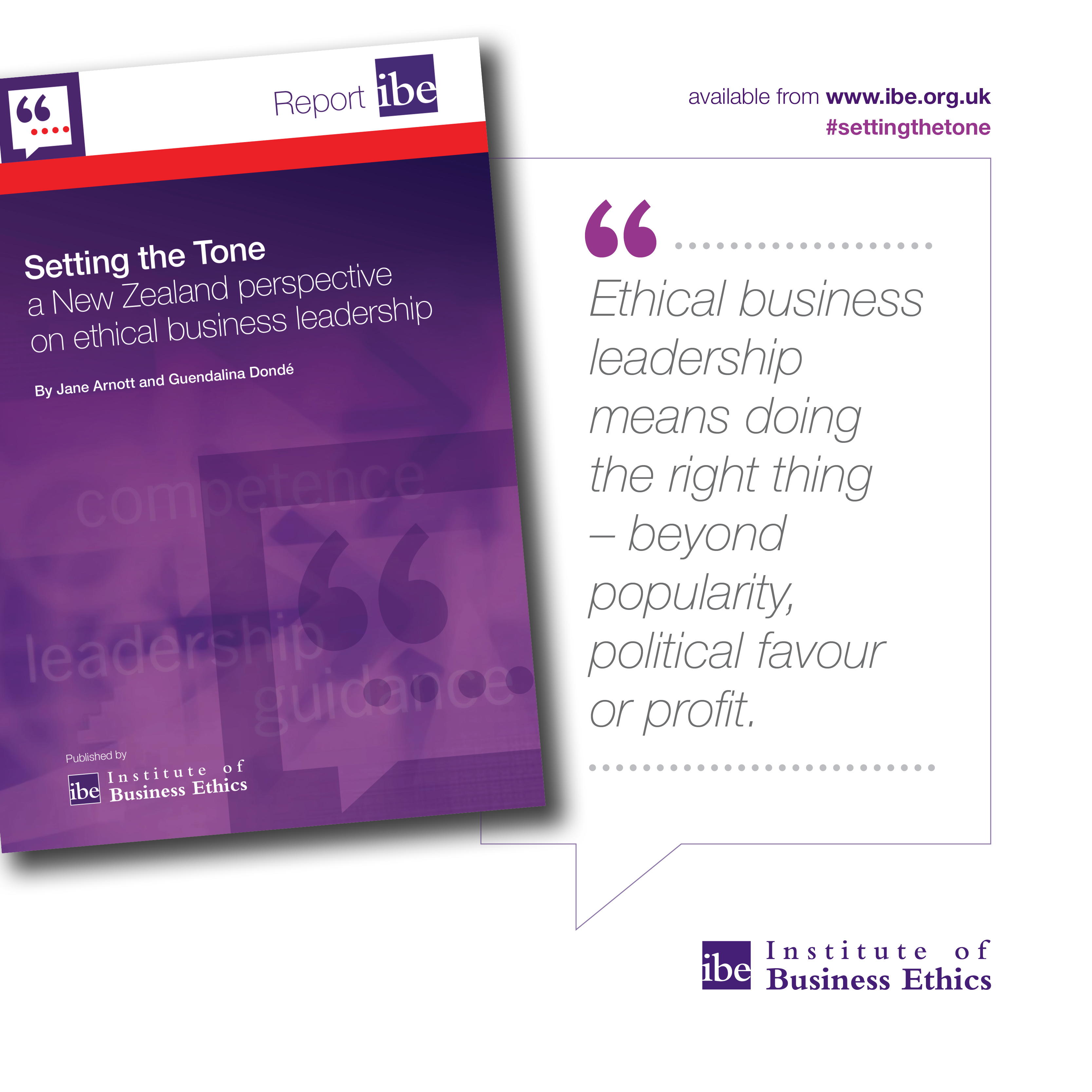New Zealand companies cannot be complacent about their ethical credentials
“Public commitment from senior leaders to ‘do the right thing,’ inspires others to do the same.
First NZ publication by the Institute of Business Ethics asks business leaders their view of the ethics in their business
28th November 2017 : Capturing perspectives on business ethics from among well known New Zealand business leaders is the subject of the Institute of Business Ethics first New Zealand publication.
‘Setting the tone: A New Zealand perspective on ethical business leadership’ draws out the challenges facing New Zealand companies and identifies how setting the tone within growing organisations needs more than just a belief that ‘everyone is ethical’.
The publication launch on 28 November, at an Auckland function hosted by Kensington Swan, comes at a time when both the NZX and FMA are reinforcing the importance of preparing and applying codes of ethics.
Interviewees were selected on the basis of their mana, their achievements and their overall standing across a cross section of sectors. Several interviewees have been recognised as pioneers in their sector, having received awards for their leadership skills or been linked to business success that has left a lasting legacy. Interviews were conducted across large and small New Zealand companies with different ownership structures and from a cross-section of sectors. A full list of interviewees is in the Editors’ notes below.
Each had their own approach to how business ethics was applied across operational areas such as risk management, culture, incentives and bonuses and internal audits.
Jane Arnott, co-author of the report and IBE NZ Associate, asked interviewees how they ensure business ethics was reinforced through policies and processes around gritty topics such as whistleblowing and conflicts of interest. But comments such as “by and large, there is a broad failure to understand the tangible link between strong commercial performance and ethical behavior”[1] and “I am not sure New Zealand has made enough philosophical steps to make us more ethical in the way we do our business .”[2] highlighted that New Zealand companies cannot be complacent about their ethical credentials.
These insights should present a wakeup call that New Zealand business has some way still to go to develop an ethical business culture.
Jane Arnott says: “While many of the companies support business ethics in principle, the implementation of a business ethics programme to help guide staff to do the right thing, was found to be the exception rather than the rule. For example, enabling employees to speak up is fundamental to risk management and reputation, but it is rarely seen in this positive light. It requires robust processes to prevent retaliation and promote trust.”
Ms Arnott adds: “Business ethics is often understood implicitly, rather than being an explicit part of the way companies ‘do things round here’. Some organisations believe they operate ethically without ever having a conversation about what that means practice, for example in areas like procurement, recruitment or engaging with customers.”
Building a business ethics programme is an ongoing process which companies develop over time. The report finds that every company was doing something to further ethical business practice. All had a code of ethics or statements that highlighted their values but only a small number of companies actually embedded, communicated and worked on making both their code and their values visible and day to day.
Key themes that emerged from the interviews include:
Ethical business leadership goes beyond compliance with the law Business success cannot be achieved through a culture of fear or control, or ticking boxes regulatory requirements. It has to be grounded in core values and in an ethical culture.
Ethical business leadership supports individual decision-making empowering people to make their own decisions, while taking into account organisational values. Creative problem solving, reasoning and discretionary judgement based on ethical values needs to replace blind obedience. This gives employees the confidence to deal with situations that are not specifically covered in the ‘rulebook’ and encourages them to ‘do the right thing’ is the right thing to do.
Ethical business leadership promotes an open culture where employees can ask questions and raise issues without fear of retaliation. This ensures that poor, unwise or non-compliant behaviour is reported and dealt with. Speaking up is seen positively and encouraged. It enables early intervention and prevention, and helps to protect a company’s reputation.
Philippa Foster Back, CBE, Director of the Institute of Business Ethics, says: “Public commitment from senior leaders to ‘do the right thing,’ inspires others to do the same. Tone from the top adds credibility to initiatives that aim to implement, embed and monitor an ethical culture within companies. ”
ENDS/
To obtain an advanced press copy of the report, or to organise interviews, please contact
For NZ - Jane Arnott, NZ Representative and IBE Associate +64 (0)274 715 785 janerarnott@gmail.com
Or for the UK - Katherine Bradshaw, Head of Communications +44 (0)7771 517700 k.bradshaw@ibe.org.uk
EDITOR’S NOTES
Setting the Tone: a New Zealand perspective on ethical leadership
By Jane Arnott and Guendalina Dondé
ISBN 978-1-908534-32-3
Publication date: 28th November 2017
Free to download from ibe.org.uk
Business Leaders who were interviewed
Mike Bennetts, CEO, Z Energy Limited
Kevin Bowler, CEO for New Zealand, Frucor
Angela Buglass, CEO, Trilogy International Ltd
Rob Campbell, Chairperson, Tourism Holdings and Summerset Group
Tony Carter, Chairperson, Air NZ and Fisher and Paykel Healthcare
Simon Challies, former CEO, Ryman Healthcare
Barbara Chapman, CEO, ASB
Mark Cairns, CEO, Port of Tauranga
Liz Coutts, Chairperson, Ports of Auckland
Martin Dippie, Chairperson, Mitre 10
Whaimutu Dewes, Chairperson, Moana NZ
Rob Fyfe, Chairperson, Icebreaker
Brian Gaynor, CEO, Milford Asset Management
Peter McBride, Chairperson, Zespri
Dame Alison Paterson, Independent Non-Executive Director, Vector
John Penno, CEO, Synlait
Mark Peterson, CEO, NZX
Bruce Plested, Chairperson and Founder, Mainfreight
Mike Sang, CEO, Ngai Tahu
Lees Seymour, CEO, Nelson Forests
Charles Spillane, CEO, Kensington Swan
Michael Stiassny, Chairperson, Vector
Anne Urlwin, Chairperson, Naylor Love Construction
Dr Brent Wheeler, Chairperson, Boardroom Practice
The Institute of Business Ethics
The Institute of Business Ethics, whose purpose is to promote high standards of business behaviour based on ethical values, is an important partner to any business wanting to preserve its long-term reputation by doing business in the right way.
For over 30 years, the IBE has advised organisations on how to strengthen their ethical culture by sharing knowledge and good practice, resulting in relationships with employees and stakeholders that are based on trust.
The IBE is a registered charity funded by corporate and individual subscriptions. www.ibe.org.uk @ibeuk
About the Authors
Jane Arnott has been IBE’s Associate and country representative in New Zealand for over 8 years. Following the completion of her post graduate studies in Professional Ethics she was instrumental (had a lead role?) in bringing IBE’s work to New Zealand and is largely responsible for business development in this country.
Jane’s professional career stems back to working on the launch of some of New Zealand’s first state owned enterprises (SOE’s) as well as IPO’s in the 80’s and 90’s, developing some of the first private public partnerships for conservation gain, founding New Zealand’s first cross cultural consultancy representing Pacific Island communities and most recently being appointed CEO reporting to the Wood Council of New Zealand following by senior marketing and consultancy roles across architecture and engineering companies and membership organisations.
Her career includes working for Government agencies, NGO’s and listed companies.
Jane researches and writes in the public domain on business ethics, governance and issues that impact stakeholders as well as undertaking training and presentations on behalf of the IBE
Guendalina Dondé is Senior Researcher at the Institute of Business Ethics. She writes and researches on a range of business ethic topics for the IBE. She is the author of the IBE Survey (2017) Corporate Ethics Policies and Programmes: 2016 UK and Continental Europe Survey and co-author of the TEI & IBE (2017) Ethics and Compliance Handbook, the IBE Core Series (2016) Codes of Business Ethics: examples of good practice and of the French and Italian IBE Survey (2015) Ethics at Work: 2015 Survey of Employees.
Before joining the IBE, she collaborated in developing the code of ethics for the Italian Association of Management Consultants and worked for a European CSR Business Network based in Brussels.
She holds a Master’s degree in Business Ethics and CSR from the University of Trento in Italy.
[1] Dr Brent Wheeler The Boardroom Practice
[2] Michael Stiassny, Chairman, Vector
Press release distributed by Pressat on behalf of Institute of Business Ethics, on Monday 27 November, 2017. For more information subscribe and follow https://pressat.co.uk/
New Zealand NZ Leadership CEO Director Chair Business Ethics Business Ethics Auckland Christchurch Business & Finance Education & Human Resources Government Opinion Article Public Sector & Legal
You just read:
New Zealand companies cannot be complacent about their ethical credentials
News from this source:





